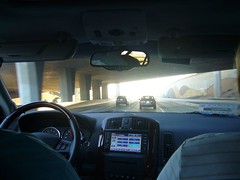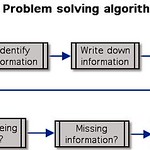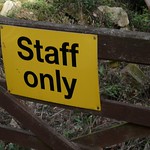Good riddance to levels in ICT and Computing
 Who’s afraid of life without Levels? Quite a few people if the number of schemes of work and assessment grids being developed that incorporate levels are anything to go by. Working without levels is clearly very hard: it is almost impossible to think, much less talk, about pupils’ progress without mentioning levels at some stage.
Who’s afraid of life without Levels? Quite a few people if the number of schemes of work and assessment grids being developed that incorporate levels are anything to go by. Working without levels is clearly very hard: it is almost impossible to think, much less talk, about pupils’ progress without mentioning levels at some stage.
Yet this is precisely what the government expects.
7 Reasons to use project-based learning in computing
 I’ve long been an advocate of project-based learning, or PBL. Done properly, it can be much richer in terms of learning opportunities, and more fun. I believe it is entirely applicable to the teaching of the new Computing Programme of Study, for the following reasons.
I’ve long been an advocate of project-based learning, or PBL. Done properly, it can be much richer in terms of learning opportunities, and more fun. I believe it is entirely applicable to the teaching of the new Computing Programme of Study, for the following reasons.7 ways to make IT real
A short while ago I published 8 articles under the heading “7 ways to make IT real”. (OK, so it looks as if I am numerically-challenged, but I'm not, as you will see!).
Well, here are the links to them, all in one place. Who says I don’t think of you!
Preparing for the new Computing Curriculum
Please note: the Westminster Forum Conference on Preparing for the new Computing Curriculum
listed in the post entitled Some useful-looking conferences takes place on the 26th February, and not the 14th as originally stated. Apologies!
The agenda and other details of the conference may be found here.
How computers decrease efficiency
 Not everything that is good, is good. Take this as an example. If I were to give my neighbour’s children some private tuition in return for a modest fee, I could go out and spend the money, thereby contributing to the local and national economy. Everyone benefits.
Not everything that is good, is good. Take this as an example. If I were to give my neighbour’s children some private tuition in return for a modest fee, I could go out and spend the money, thereby contributing to the local and national economy. Everyone benefits.
On the other hand, if I were to go on a really prolific one-man burglary spree, they would have to employ extra police or pay the existing police force more overtime, local residents would invest in updated security systems and the local economy would benefit even more from all this spending.
Videos on aspects of Computing and ICT
I thought you might be interested in two new sets of video resources which are, and are becoming, available. The big problem with video in general, in my opinion, is that it’s hard to find the time to sit down and watch something for any length of time because you can’t do much else while you’re doing so. And by “any length of time” I mean anything over about 5 minutes.
So it’s good that there are some 3 minute videos now and some micro-videos coming on stream.
7 Ways to make IT real: 7 Use online resources
7 Ways to make IT real: #5 Be realistic
One sure-fire way to turn pupils off computing and ICT is to set tasks that are either unrealistic in themselves, or contain unrealistic elements.
As an example of the former, I once came across an activity in which
7 Ways to make IT real: #4 Use external organisations
 When you’re attempting to give your pupils a flavour of the “real world”, it’s important to remember two things:
When you’re attempting to give your pupils a flavour of the “real world”, it’s important to remember two things:7 Ways to make IT real: #3 Solve real problems
 As I said in 7 ways to make IT real: #0 Make IT unreal, setting the kids a problem like “Imagine you’re going to open a video shop” is not going to cut it these days. You either need to set problems that are outlandish and obviously unreal, or set them ones which are all too real.
As I said in 7 ways to make IT real: #0 Make IT unreal, setting the kids a problem like “Imagine you’re going to open a video shop” is not going to cut it these days. You either need to set problems that are outlandish and obviously unreal, or set them ones which are all too real.
I’d suggest that the best way of doing so is to get the pupils themselves to identify problems. That’s the approach taken by
7 Ways to make IT real: #2 Involve parents
 It’s easy to see parents as “just” parents. They bring their kids to school, you let them know how their child is getting on, and that’s maybe as far as it goes. But it’s worth remembering that parents are also people in their own right, with interests and jobs that may be useful in terms of giving your pupils a real-world focus for computing and ICT.
It’s easy to see parents as “just” parents. They bring their kids to school, you let them know how their child is getting on, and that’s maybe as far as it goes. But it’s worth remembering that parents are also people in their own right, with interests and jobs that may be useful in terms of giving your pupils a real-world focus for computing and ICT.7 Ways to make IT real: #1 Get local
 It’s easy to take your local area for granted, but try to see it with new eyes. Try to see it as if you were a tourist visiting the area for the first time. You may be pleasantly surprised to discover just how much is noteworthy from a computing or ICT point of view. Whether you want your pupils to simply notice the use of technology, or wish to get them to figure out how things work or even to create their own digital assets, you won’t be disappointed.
It’s easy to take your local area for granted, but try to see it with new eyes. Try to see it as if you were a tourist visiting the area for the first time. You may be pleasantly surprised to discover just how much is noteworthy from a computing or ICT point of view. Whether you want your pupils to simply notice the use of technology, or wish to get them to figure out how things work or even to create their own digital assets, you won’t be disappointed.7 ways to make IT real: #0 Make IT unreal
 One way to make ICT interesting is to make sure it is relevant to young people’s lives, and has a genuine connection to the “real world”. Indeed, these are required of Ofsted in order to achieve an “Outstanding” grade in ICT. I have referred to this as “authentic learning”. So, in the next few articles I will be suggesting ways of approaching this.
One way to make ICT interesting is to make sure it is relevant to young people’s lives, and has a genuine connection to the “real world”. Indeed, these are required of Ofsted in order to achieve an “Outstanding” grade in ICT. I have referred to this as “authentic learning”. So, in the next few articles I will be suggesting ways of approaching this.7 Criteria for evaluating a computing scheme of work
 Now that it’s certain that here in England we will have a computing curriculum to follow in September 2014, many people are going to be writing schemes of work. Whether you are a producer or a consumer in this regard, I think you will find the following evaluation criteria useful.
Now that it’s certain that here in England we will have a computing curriculum to follow in September 2014, many people are going to be writing schemes of work. Whether you are a producer or a consumer in this regard, I think you will find the following evaluation criteria useful.Data shock
 Here are three short observations on data, which may provide a basis for discussion with pupils.
Here are three short observations on data, which may provide a basis for discussion with pupils.
1. What we can learn from the Ice Age
A few weeks ago I went to the Ice Age art exhibition at the British Museum.
3D Printing
ICT Lessons and internet privacy
 Whatever you think of the current debate over news that the US Government may have been monitoring the online activity of not only its own citizens but those of other countries too, you have to admit one thing. It provides a great opportunity for ICT teachers everywhere to bring some real-world issues into their lessons, in a very newsy (ie current) way.
Whatever you think of the current debate over news that the US Government may have been monitoring the online activity of not only its own citizens but those of other countries too, you have to admit one thing. It provides a great opportunity for ICT teachers everywhere to bring some real-world issues into their lessons, in a very newsy (ie current) way.Why not experiment when teaching ICT?
 It’s amazing what you can achieve with a paintbrush and a fork. Yesterday morning I watched in helpless horror as the lid of something fell down the plug hole in the bathroom sink. I could see it, just about, using the flashlight app on my smartphone (I knew there was more to smartphones than just being connected), but couldn’t reach it.
It’s amazing what you can achieve with a paintbrush and a fork. Yesterday morning I watched in helpless horror as the lid of something fell down the plug hole in the bathroom sink. I could see it, just about, using the flashlight app on my smartphone (I knew there was more to smartphones than just being connected), but couldn’t reach it.Two effects of new technology
 Here are a couple of interesting cartoon strips about the (possible) effects of new technology. Yesterday’s one is more about unintended consequences, while today’s is really about how apparently intelligent software and monitoring systems might be fooled.
Here are a couple of interesting cartoon strips about the (possible) effects of new technology. Yesterday’s one is more about unintended consequences, while today’s is really about how apparently intelligent software and monitoring systems might be fooled.